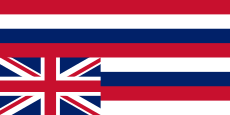| Overthrow of the Hawaiian Kingdom | |||||||
|---|---|---|---|---|---|---|---|
| Part of the Hawaiian Rebellions (1887–1895) | |||||||
 The USS Boston's landing force on duty at the Arlington Hotel, Honolulu, at the time of the overthrow of the Hawaiian monarchy, January 1893. Lieutenant Lucien Young, USN, commanded the detachment, and is presumably the officer at right.[1] | |||||||
| |||||||
| Belligerents | |||||||
|
|
| ||||||
| Commanders and leaders | |||||||
| Strength | |||||||
United States
|
496 troops[2]
| ||||||
| Casualties and losses | |||||||
| None | 1 wounded | ||||||
| Part of a series on the |
| Hawaiian sovereignty movement |
|---|
 |
| Main issues |
| Governments |
| Historical conflicts |
| Modern events |
| Parties and organizations |
| Documents and ideas |
| Books |
The overthrow of the Hawaiian Kingdom was a coup d'état against Queen Liliʻuokalani that took place on January 17, 1893, on the island of Oahu, and was led by the Committee of Safety, composed of seven foreign residents (five Americans, one Scotsman, and one German[5]) and six Hawaiian Kingdom subjects of American descent in Honolulu.[6][7] The Committee prevailed upon American minister John L. Stevens to call in the US Marines to protect the national interest of the United States of America. The insurgents established the Republic of Hawaii, but their ultimate goal was the annexation of the islands to the United States, which occurred in 1898.
The 1993 Apology Resolution by the US Congress concedes that "the overthrow of the Kingdom of Hawaii occurred with the active participation of agents and citizens of the United States and [...] the Native Hawaiian people never directly relinquished to the United States their claims to their inherent sovereignty as a people over their national lands, either through the Hawaiian Kingdom or through a plebiscite or referendum". Debates regarding the event play an important role in the Hawaiian sovereignty movement.
- ^ U.S. Navy History site. History.navy.mil (March 22, 2005). Retrieved on July 6, 2011.
- ^ Young, Lucien (1899). The Real Hawaii. Doubleday & McClure company. p. 252.
- ^ Kuykendall 1967, p. 605.
- ^ Spencer, Thomas P. (1895). Kaua Kuloko 1895. Honolulu: Papapai Mahu Press Publishing Company. OCLC 19662315.
- ^ Legacy, Nisei Veteran (August 31, 2022). "Hawaiian Monarchy Overthrown; Territory of Hawaii". \nvlchawaii.org/. Retrieved August 19, 2024.
- ^ Congressional Record: Proceedings and Debates of the Congress. U.S. Government Printing Office. 1894.
WHO WERE THE PARTIES THAT ASKED FOR AMERICAN AID. Six of them were Hawaiians, one English, and one German; five were Americans, but residents of Honolulu; a majority alien to us.
- ^ Kam, Ralph Thomas; Lyons, Jeffrey K. (2019). "Remembering the Committee of Safety: Identifying the Citizenship, Descent, and Occupations of the Men Who Overthrew the Monarchy". The Hawaiian Journal of History. 53. Honolulu: Hawaiian Historical Society: 31–54. doi:10.1353/hjh.2019.0002. hdl:10524/63187. ISSN 2169-7639. OCLC 60626541. S2CID 212795443.